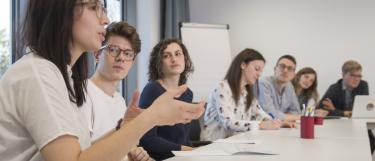
Study
STUDYING INTERDISCIPLINARITY
The Marsilius Studien enables students and doctoral candidates to look beyond the boundaries of their own discipline and find ways of dialogue and joint work between the natural sciences and the humanities. The program was established in 2010 by student initiative as an open program and offers insights into other scientific fields and interdisciplinary research. Participants benefit from the broad spectrum of subjects offered by the University and acquire skills that are becoming increasingly important in professional life. Participation in the Marsilius Studien can lead to the award of the Marsilius Certificate.
Marsilius-Studien
The core of the Marsilius-Studien is the so-called bridge seminars, which are co-led by at least two lecturers from different scientific fields. The participants deal with interdisciplinary topics that usually originate from the projects of the Marsilius Fellows. Additionally, there are workshops and events on scientific communication from outside the discipline as part of the Nature Marsilius Visiting Professorship. By attending a final lecture in the interdisciplinary colloquium, the participants can obtain the Marsilius Certificate.
Marsilius Academies
The Marsilius Academies are interdisciplinary conferences for young academics from Germany and abroad. Renowned speakers are invited to give lectures and participate in discussions. The Marsilius Academies give participating young academics the opportunity to forge research-based links with other research cultures and other locations for scientific research.
Nature Marsilius Visiting Professorship
The visiting professorship for science communication, established in the winter term 2018/2019, is a joint initiative of the Veranstaltungsforum of Holtzbrinck Berlin, the Klaus Tschira Foundation (KTS) and Ruperto Carola. A champion of excellent science communication and quality journalism is usually appointed as a guest professor each semester. Along with the furtherance these aims, young researchers are also trained to better communicate their research and findings to the public.








